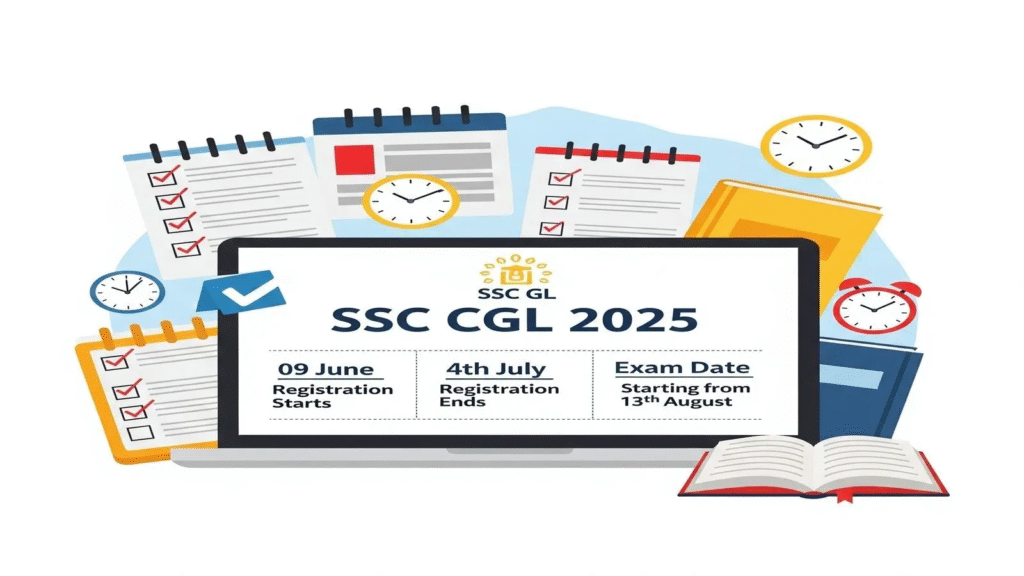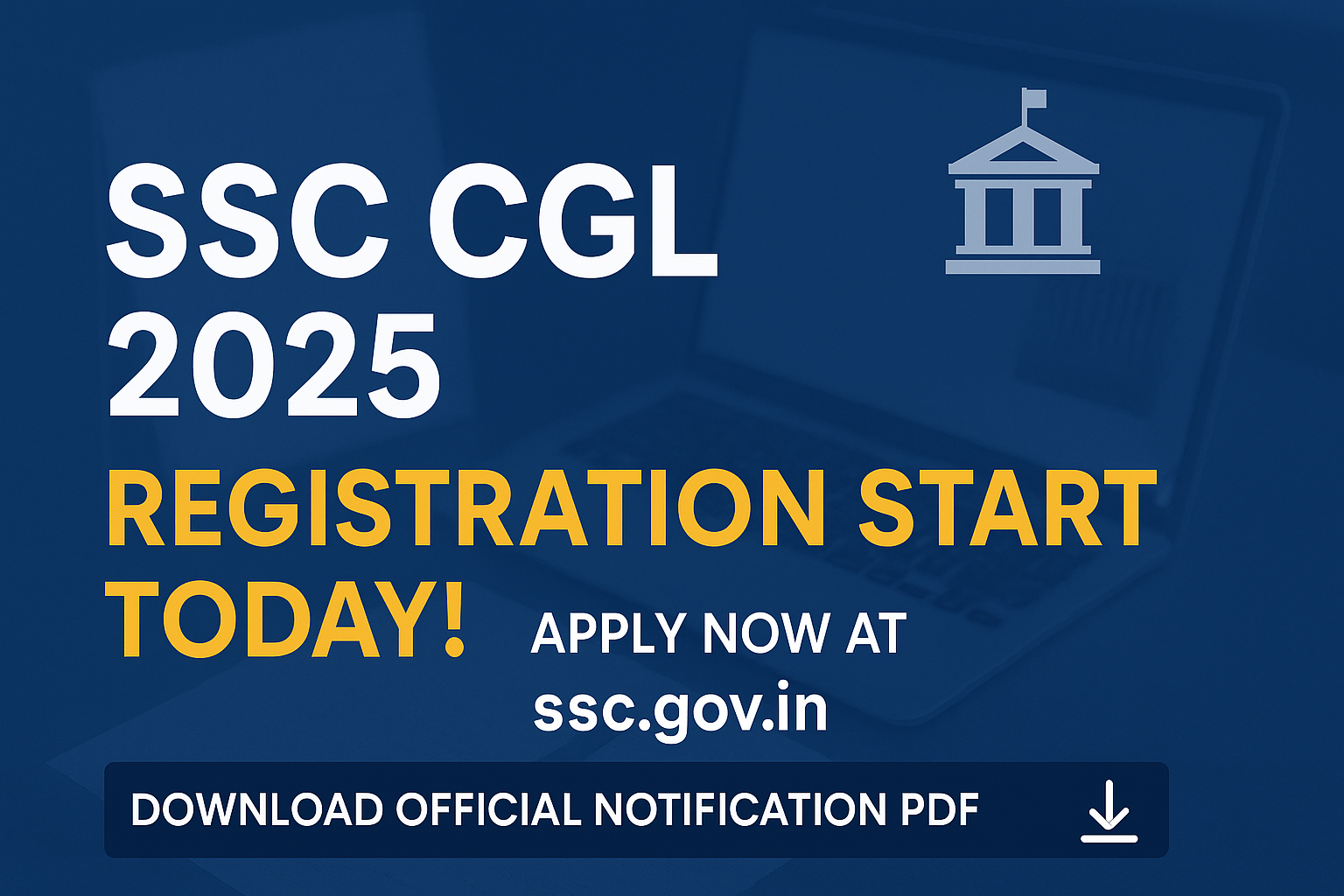
The wait is over for thousands of government job aspirants as the Staff Selection Commission (SSC) has officially opened the registration window for the Combined Graduate Level (CGL) Examination 2025. This year’s notification, published on the official SSC website — ssc.gov.in — signals the start of a rigorous yet rewarding journey for candidates across India aiming to secure coveted posts in various central government ministries, departments, and organizations.
The SSC CGL exam has long been regarded as one of the most competitive and prestigious recruitment drives in the country. It not only offers job stability and attractive pay scales but also serves as a platform for young graduates to contribute meaningfully to the nation’s administrative machinery. The registration phase, a crucial first step in this journey, demands careful attention and prompt action.
The Evolution and Significance of SSC CGL
Understanding the SSC CGL examination requires a glance at its history and role within India’s vast recruitment framework. Established to streamline the recruitment of Group B and C staff across government sectors, SSC CGL has evolved over decades to accommodate the increasing demand for skilled and efficient civil servants.
Each year, millions of graduates participate, reflecting the examination’s stature and the wide-ranging career opportunities it offers. The exam’s multiple tiers are meticulously designed to test a candidate’s intellectual, analytical, and practical skills. Successful candidates fill positions ranging from Inspectors, Auditors, and Assistants to specialized roles in taxation, finance, and enforcement.
This examination holds a unique place among government exams because of its vast scope and impact. Cracking SSC CGL is often seen as a milestone for candidates, marking the beginning of a stable and respected career.
SSC CGL 2025 Registration Process: What Aspirants Must Know
The SSC has made the registration process for the 2025 examination user-friendly and accessible. Candidates eager to apply can do so via the official SSC portal — ssc.gov.in. This digital interface is equipped to handle the large volume of applications expected this year, ensuring smooth processing.
To register, candidates must provide personal details, academic qualifications, and contact information. Importantly, they should upload a scanned photograph and signature in the prescribed format. Any discrepancy or error in these details can lead to rejection or disqualification later in the process.
The registration window, though generous, is limited — prompting aspirants to act quickly. Moreover, the SSC has implemented robust payment options, including net banking, UPI, and card payments, allowing applicants to pay the application fee conveniently.
Eligibility Criteria: Ensuring Fairness and Transparency
Eligibility requirements serve as a foundational pillar for the SSC CGL examination to ensure that only qualified candidates compete. For 2025, candidates must hold a bachelor’s degree from a recognized university. Additionally, there are age restrictions that vary based on the category and the post applied for, generally ranging from 18 to 32 years, with relaxations provided for reserved categories in accordance with government norms.
The SSC’s strict adherence to these rules reflects its commitment to fairness, preventing underqualified candidates from advancing in the recruitment process. It is imperative for applicants to verify their eligibility thoroughly before applying.
Understanding the SSC CGL Examination Pattern
SSC CGL 2025 follows a multi-tier examination system, designed to filter candidates progressively through rigorous assessments. Tier-I is an objective exam assessing general intelligence, reasoning, quantitative aptitude, and English comprehension. This stage lays the groundwork for determining a candidate’s basic proficiency.
Tier-II delves deeper, focusing on more advanced quantitative abilities, English language skills, and domain-specific knowledge like statistics and finance for specialized roles. Tier-III comprises descriptive paper tests designed to assess candidates’ written communication, including essay writing and letter drafting.
Finally, Tier-IV involves skill tests, document verification, or computer proficiency tests as applicable for certain posts. This layered structure ensures that only the most capable candidates reach the final stages, maintaining the SSC’s high standards.
The Importance of Preparation and Study Strategy
Preparation for SSC CGL is more than rote learning; it demands a well-planned strategy, time management, and mental resilience. Aspirants should start by understanding the syllabus and exam pattern in detail, followed by creating a personalized study timetable.
The use of standard textbooks, coaching materials, and online resources is highly recommended. Mock tests and previous years’ question papers are invaluable tools, enabling candidates to familiarize themselves with question formats and improve speed and accuracy.
Equally important is maintaining physical and mental health during preparation. Regular breaks, physical exercise, and stress-relief practices can keep candidates motivated and focused.
Key Dates and Timelines for SSC CGL 2025
Being aware of critical dates is essential to avoid missing any deadlines. The SSC CGL 2025 registration began on June 8, 2025, and the last date to apply is July 5, 2025. The admit cards for Tier-I are expected to be released by August 20, 2025, with the Tier-I examination scheduled for early September 2025.
Candidates who clear the Tier-I examination can anticipate Tier-II exams by November 2025. The final results and subsequent stages like Tier-III and Tier-IV will follow accordingly. Staying updated through SSC’s official website is the best way to keep track of changes or announcements.
Career Opportunities Post SSC CGL 2025: What Awaits Successful Candidates
Clearing the SSC CGL examination opens up a world of opportunities. The posts offered are diverse, ranging from Assistant Audit Officer, Inspector of Income Tax, and Sub-Inspector to Excise Inspector and Tax Assistant. Each role comes with distinct responsibilities but collectively contributes to the functioning of India’s governance and administrative systems.

Government jobs secured through SSC CGL are highly valued for job security, benefits, and opportunities for career advancement. Candidates often experience rapid professional growth and the chance to serve in different parts of the country.
Moreover, SSC CGL jobs often come with perks like pension schemes, medical benefits, and housing allowances, making them attractive for long-term career planning.
How Technology is Shaping SSC CGL Preparations
The digital revolution has transformed competitive exam preparation. Candidates can now access an array of online platforms providing video tutorials, practice quizzes, and mock exams.
Technology aids in customizing study plans based on individual performance analytics, helping aspirants focus on weak areas. Online forums and social media groups also allow sharing of resources and peer support.
Furthermore, SSC has embraced technology by conducting online registrations, digital admit cards, and even computer-based tests, making the examination process more transparent and efficient.
Challenges Faced by SSC CGL Aspirants and How to Overcome Them
The high competition level is one of the most significant challenges faced by SSC CGL candidates. With millions applying, even minor mistakes can cost dearly. Psychological pressure, time constraints, and vast syllabus coverage add to the complexity.
Overcoming these challenges requires discipline, focus, and strategic preparation. Time management during the exam is crucial; candidates should practice pacing themselves through mock tests.
Another obstacle is misinformation. Aspirants must rely on official SSC notifications and trusted educational platforms to avoid confusion.
SSC CGL 2025 and the Larger Landscape of Government Recruitment
SSC CGL is not just an exam but a pivotal part of India’s broader public sector recruitment ecosystem. It reflects the government’s intent to attract young, qualified professionals to build a robust administrative cadre.
Alongside SSC CGL, other exams like UPSC, state PSCs, and bank exams form the constellation of opportunities for government service. SSC CGL stands out because of its scale, range of posts, and the transparency of its recruitment procedures.
Candidates preparing for SSC CGL often find that the skills and knowledge acquired are transferable across other competitive exams, increasing their overall employability.
Success Stories and Motivation for Aspirants
Stories of SSC CGL toppers and successful candidates are a great source of inspiration. Many have shared how consistent efforts, effective strategies, and unwavering determination helped them overcome hurdles.
These stories emphasize the importance of self-belief, adaptability, and continuous learning. Aspirants are encouraged to learn from these examples and craft their unique preparation journey.
The Role of Coaching and Self-Study
While coaching centers offer structured guidance, many candidates also succeed through disciplined self-study. The choice depends on individual learning preferences, financial resources, and access to study materials.
With the availability of quality online resources, self-study has become more viable than ever. Aspirants should evaluate their strengths and weaknesses and choose the path best suited to them.
Conclusion: Making the Most of SSC CGL 2025
SSC CGL 2025 is more than just an examination; it is an opportunity to transform lives and careers. With the registration phase underway, the onus lies on candidates to prepare effectively, stay updated, and navigate the recruitment process with diligence.
The government’s transparent and efficient process, combined with the aspirants’ dedication, ensures that SSC CGL continues to be a benchmark in competitive examinations in India.
By embracing the challenges and opportunities that come with SSC CGL 2025, candidates can set themselves on a promising path to becoming integral parts of India’s civil services.

